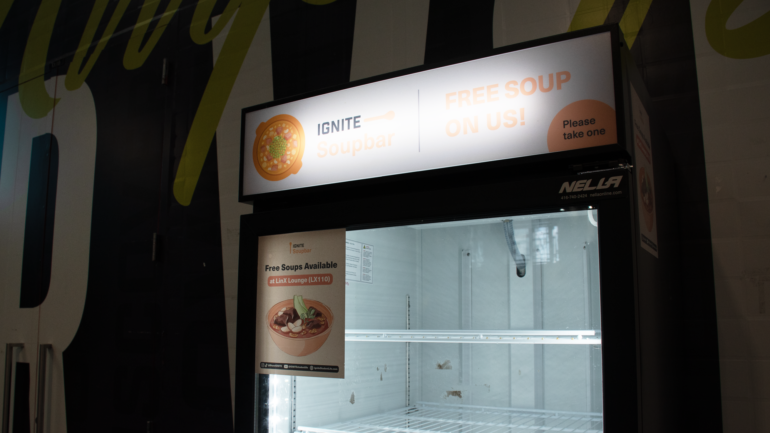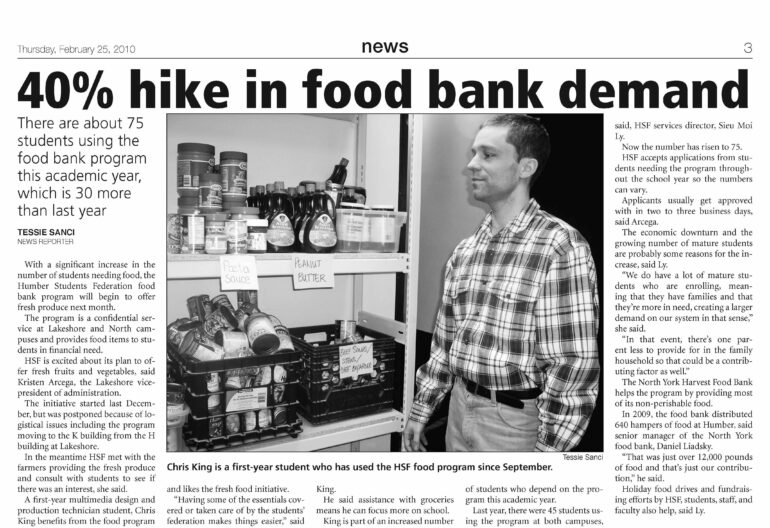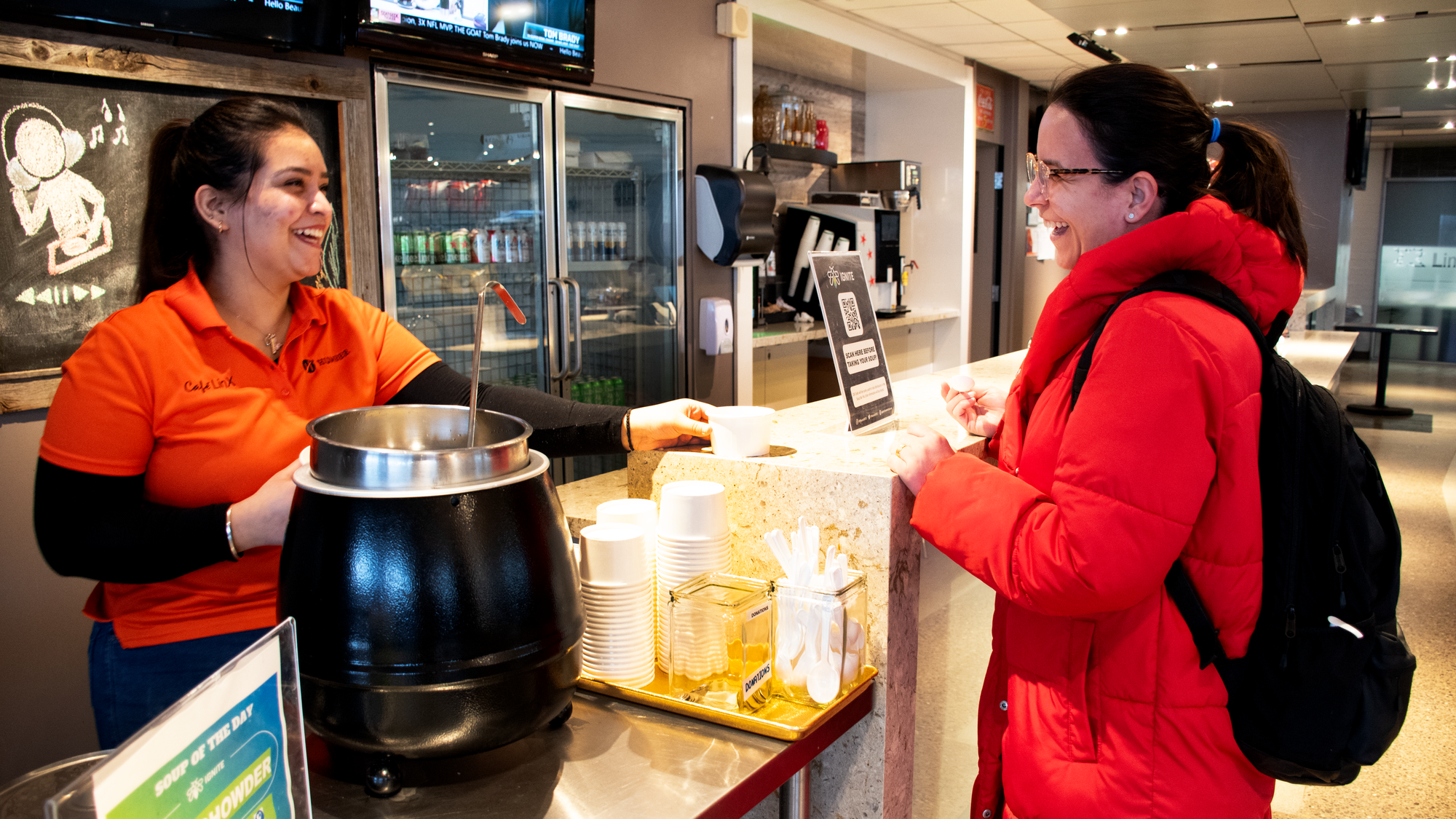A bowl of soup can feel like a comforting hug in the chill of winter or on sick days, but it is not the antidote for the deepening crisis of student hunger at Humber College.
Soaring food prices, depressingly low wages and unfavourable circumstances in life contribute to the prevalence of food insecurity.
However, the responsibility lies with universities and colleges to advocate for and care for their students.
A 2023 report for BMC Public Health found 15 per cent of full-time post-secondary students across Canada are food insecure.
Humber College is home to about 38,000 full-time students and 10,000 international students, including myself.
My parents shelled out $8,401.50 for my journalism education this semester, while my Canadian classmates paid significantly less at $1,892.34.
Having transitioned from living with my aunt in Mississauga, where commuting costs were a daily challenge, to renting a basement room for $750 a month and managing my groceries and bills, I’ve experienced firsthand the struggles many students face.
While I don’t have a family to feed, I empathize with schoolmates who do and friends who support themselves.
For some, food is a privilege.

The fridge for frozen soup from IGNITE sits empty on Jan. 25. IGNITE student advocate Jessica Carrera says the council relies on kitchen scraps for broth and leftover ingredients from the culinary program and limited funds.
The free soups the student union IGNITE offers in partnership with Humber College, though well-intentioned, fall short of addressing the widespread issue.
Hot soups served weekly at the North campus offer little assistance when the exact times remain undisclosed on posters and the location, LinX Lounge, is unfamiliar to some students.
The frozen grab-and-go soups, which are supposedly available to all campuses, are limited.
To echo Sanskriti Mansotra, a computer engineering technology student from India who Humber News interviewed last September, even if the soups were unlimited, how long can a person live on it?
While campus food banks are a patchwork approach and not a permanent solution, their impact is nuanced and urgently needed.
Having a comprehensive food program is not too much to ask. George Brown College’s student union has a food hamper program that supplies students with three weeks’ worth of groceries.
Students in financial need at Loyalist College can order non-perishable food, school supplies and personal hygiene items from their food cupboard for free and online, thanks to then-president Ann Marie Vaughan, now the president of Humber College.
The idea of a food bank or community pantry on our campus is not unprecedented. Humber had one before.

A clipping from an Et Cetera issue published on Feb. 25, 2010, shows the campus food bank on Humber College North campus. The food bank no longer exists, despite rising food insecurity among post-secondary students in Canada. Photo credit: Humber Archives/John Yolkowski
Et Cetera newspaper’s archives reveal the shift from the campus food bank to grocery gift cards in 2014.
Today, we have the Soupbar, a collaborative effort among IGNITE, the culinary and nutrition departments and the Humber Arboretum to tackle hunger and sustainability at once.
Jessica Carrera, who oversees food security initiatives at IGNITE, said low demand pushed the student union, then called the Humber Student Federation, to end the food bank sometime in mid-2010s.
“How long can we keep those products in our storage with students not coming in,” Carrera said. “The risk of that is rodents and bacteria.”
But if the school refuses to take action, the risk to students is far greater and irreversible.
A case study from Montana State University showed it’s not just a student’s mental and physical health that takes a hit in the face of food insecurity.
Learning suffers, too, the study revealed.
If IGNITE can send hundreds of email surveys and promote their concerts and games, they can reach those most in need, forecast the demand and dietary restrictions and avoid food waste.
If Humber College can build a cultural hub, it can bring together people and resources to support IGNITE in expanding its food programs, training staff and ensuring continuity.
A campus food bank may not be a PR triumph for the school, but it can be innovative for students instrumental to their existence.
Establishing a dedicated, non-intimidating space for a campus food bank eliminates the stigma associated with seeking assistance. It eliminates the fear of judgement and shame of standing in line for free soup.
Moreover, food banks teach students social awareness and empathy around hunger — an experience many are fortunate to never encounter.
Reviving the grocery gift cards, if not the campus food bank, would allow students to make choices with more dignity and have a reliable fallback when traditional food banks turn them away.
Student advocate Carrera said IGNITE is “having conversations” with different departments at Humber College and looking into what other post-secondary institutions are doing.
“It’s not easy,” Carrera said. “We want to offer other things to students too.”
She said IGNITE also has scholarships and bursaries, reimbursement for learning essentials and social events to give students a good college experience.
“We try our best to balance everything out, and food insecurity is on [top of my] list,” she said.
As someone who contributes nearly $130 a year in union fees, I always hope for the best.
When I worry less about where my next meal comes from, I can focus more on my studies and simply be a student.

